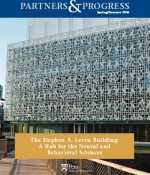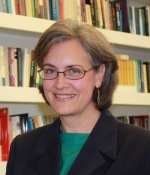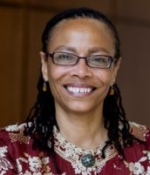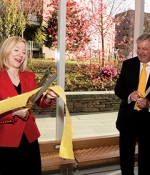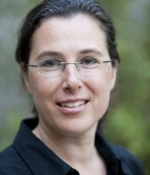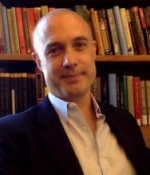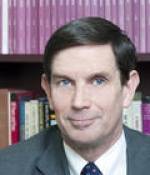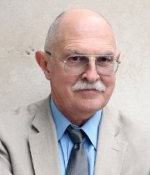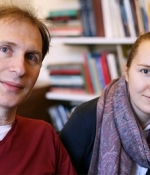2016
Penn’s EnerFront Sparks New Ideas on Energy Sustainability
A new collaboration, EnerFront, is leading a series of forums through the fall semester to invite researchers from different disciplines to talk about energy. The concept originated with Reto Gieré, professor and chair of the Department of Earth and Environmental Science, and the department’s research program manager, Svetlana Milutinović. They hope the initiative, now in its second semester, will continue building a community of researchers from around the University.
In Memoriam: Professor Richard R. Beeman
Richard R. Beeman, John Welsch Centennial Professor of History, Emeritus, at the University of Pennsylvania, died on September 5, 2016, at the age of 74. Beeman was born in Seattle, Washington, in 1942 and was raised in Long Beach, California. He received his BA from the University of California, Berkeley (1964); an MA from the College of William and Mary (1965); and a PhD under the supervision of Daniel Boorstin from the University of Chicago (1968).
Witnessing Geology’s Impact Firsthand With Penn in the Alps
As part of the Penn Summer Abroad program, the participants in the 10-day “Penn in the Alps” course received an intellectually and physically rigorous introduction to a region with geological, biological, historical, political, and cultural traits found nowhere else.
'Being and Learning in a Digital Age’ Examines Online Learning
As higher education institutions wrestle with the future of massive open online courses, or MOOCs, the University of Pennsylvania will host the third annual conference focused on online learning, Oct. 6-7.
Penn Arts and Sciences Welcomes New Faculty for 2016-2017
Penn Arts and Sciences has appointed 26 new members to its standing faculty for the 2016-2017 academic year. The School is pleased to welcome:
Biologists Reveal How Sleep Deprivation Harms Memory
A study in mice has, for the first time, shown that five hours of sleep deprivation leads to a loss of connectivity between neurons in the hippocampus, a region of the brain associated with learning and memory. The study is to be published in the journal eLife.
Stigma of Record Stays with Individual, Regardless of Crime Type, Conviction
What collateral damage comes from having a criminal record?
Nicholas Sambanis Named Presidential Distinguished Professor
Nicholas Sambanis has been named a Presidential Distinguished Professor in the School of Arts and Sciences’ Department of Political Science. Sambanis, who joined the department effective July 1, is among the world’s leading scholars of violent civil wars, secessionist conflicts, and strategies for conflict resolution and peace-building.
People Prefer Explanations That Refer to a More Fundamental Science
Why do some science news stories catch our eye, even if they use exaggerated, irrelevant, or inaccurate information?
Rogers Smith Elected to the American Philosophical Society
Rogers Smith, Christopher H. Browne Distinguished Professor of Political Science; chair of the Penn Program on Democracy, Citizenship, and Constitutionalism; and associate dean for social sciences, has been selected for membership in the American Philosophical Society.
Julie Nelson Davis of Penn Collaborates With Smithsonian
Art historian Julie Nelson Davis is partnering with the Smithsonian’s Freer|Sackler Galleries on two projects in Washington, D.C.“It’s like a dream come true,” said Davis, a professor in the History of Art Department and the senior consulting curator at the Smithsonian’s Museums of Asian Art.
Spring/Summer 2016 Issue of “Partners and Progress” Highlights Alumni Community
Twice a year, Partners and Progress, the publication dedicated to highlighting Penn Arts and Sciences’ vibrant and generous community of alumni, parents, and friends, sheds light on exciting new developments at the School. In this Spring/Summer 2016 issue we take a tour of the new Stephen A. Levin Building, a hub for the neural and behavioral sciences; report on alumni events; and remember Overseer Chair and Penn Trustee David Silfen, C'66.
Having Well-connected Friends Benefits Female Baboons, Study Finds
In humans, it’s well documented that having a healthy social life is associated with better physical health. The same is true for baboons: females who have close bonds with other females live longer and have greater reproductive success.
Study Models How the Immune System Might Evolve to Conquer HIV
It has remained frustratingly difficult to develop a vaccine for HIV/AIDS, in part because the virus, once in our bodies, rapidly reproduces and evolves to escape being killed by the immune system.“The viruses are constantly producing mutants that evade detection,” says Joshua Plotkin, professor of biology. “A single person with HIV may have millions of strains of the virus circulating in the body.”
Former CEO of Philadelphia Water Joins Penn Research Centers as Senior Fellow
The Fels Policy Research Initiative at Penn Arts and Sciences and the Kleinman Center for Energy Policy at PennDesign the jointly welcome Howard Neukrug, who will serve both institutions as a senior fellow during the 2016-2017 academic year. Neukrug is the former CEO of Philadelphia Water and a senior fellow at the U.S. Water Alliance.
Beth Simmons Appointed Penn Integrates Knowledge Professor
President Amy Gutmann and Provost Vincent Price are pleased to announce the appointment of Beth Simmons as the University of Pennsylvania’s 18th Penn Integrates Knowledge University Professor, effective July 1, 2016. A world-renowned authority on international relations and human rights, Simmons is the Andrea Mitchell University Professor, with joint faculty appointments in the Law School and the Department of Political Science in Penn Arts and Sciences.
Doctoral Candidate Studies Economic ‘Dynamic Game Theory’
When you want to buy a new cell phone or eat out, how do you decide which brand to purchase or which restaurant to dine in? According to Daniel Hauser, a fifth-year doctoral candidate in the Department of Economics, it has to do with motivation on the part of the business and perception on the part of the consumer. An organization must decide whether to promote strong products or defend against attacks on weak ones.
Animals ‘Inherit’ Their Social Network From Their Mothers
In a newly published study in the journal Nature Communications, Erol Akçay, an assistant professor of biology, and Amiyaal Ilany, a postdoctoral researcher, developed a mathematical model of the way social networks arise in animal populations.
Chemists Establish Fundamentals of Ferroelectric Materials
Ferromagnetic materials are useful because their magnetic polarization makes them rotate to align with magnetic fields. Since external electric fields can reorient the electric polarization of these materials, they are ideal for certain memory applications, such as stored-value cards used in mass-transit systems.
Penn Arts and Sciences Offering Four New Minors
As of this fall, Penn Arts and Sciences will offer four new options for minors to undergraduates at Penn. The new fields of study will be in archaeological science, East Central European studies, law and society, and medical sociology.CAAM Minor in Archaeological Science
Two Honors for PIK Professor Dorothy Roberts
Dorothy Roberts has been selected to receive the Society of Family Planning Lifetime Achievement Award. She will be honored in November at the society's 2016 annual meeting, the North American Forum on Family Planning, in Denver, Colorado.
Political Scientist Spotlights the ‘Shadow of Unfairness’ in Democracy
In his new book The Shadow of Unfairness: A Plebeian Theory of Liberal Democracy, Jeffrey Green, an associate professor of political science, says a person’s socioeconomic status on average determines future opportunities, from education to career advancement.
Penn Back Then: Alumni Weekend 2016
Penn Back Then is a continuing oral history project begun in May 2005 by the School of Arts and Sciences. At campus celebrations each year, alumni from all decades can contribute their notable anecdotes and remembrances to this audio scrapbook
The Stephen A. Levin Building: A Hub for the Neural and Behavioral Sciences
Penn Arts and Sciences officially opened the Stephen A. Levin Building with a dedication ceremony on April 14. The six-story, $68.6 million, 78,000-square-foot building integrates psychology, biology, and behavioral sciences under one roof with research laboratories, teaching facilities, and space for students to collaborate and study.
Cooperation Emerges When Groups Are Small and Memories Are Long
In a new paper published in the journal Scientific Reports, Penn researchers use game theory to demonstrate the complex set of traits that can promote the evolution of cooperation. Their analysis showed that smaller groups in which actors had longer memories of their fellow group members’ actions were more likely to evolve cooperative strategies. The work suggests one possible advantage of the human’s powerful memory capacity: It has fed our ability as a society to cooperate.
Petryna Honored for Contribution to Anthropology
Adriana Petryna, Edmund J. and Louise W. Kahn Term Professor of Anthropology, has been awarded the biennial Wellcome Medal from the Royal Anthropological Institute of Great Britain and Ireland for “a body of published work which makes, as a whole, a significant contribution to research in anthropology as applied to medical problems.”
Spafford Wins NEH Fellowship to Study Japan’s Warrior Houses
David Spafford, assistant professor of East Asian Languages and Civilizations, has been awarded a fellowship from the National Endowment for the Humanities (NEH) to study the corporate warrior house in Japan from 1450 to 1650. He is researching the social functions of the warrior house, exploring in particular practices and ideas about family identity, survival, and legacy.
People More Likely to Defer Making Decisions the Longer They Wait
Would you rather eat an apple or a banana? Read Moby Dick or A Tale of Two Cities? Is a cup or a mug holding that coffee?How quickly the decision gets made matters. That’s because the longer someone takes to draw a conclusion, the more likely that person will disengage from the process altogether and simply never decide.
Researcher Looks at Healthy Changes Through a Political Lens
In Governing With Words: The Political Dialogue on Race, Public Policy and Inequality in America, Daniel Gillion says politicians are sharers of health information with the potential to increase awareness of health issues and advise minorities on best practices.Gillion, an associate professor of political science, focuses his research on racial and ethnic politics, political behavior, public opinion, and the American presidency.
Study Finds Well-Being Necessary Part of Public Policy Agenda
“Well-being can and should drive public policy, from the most local to the most international levels.”
Two Scientists Elected to the National Academy of Sciences
Marsha Lester, Edmund J. Kahn Distinguished Professor of Chemistry, and Andrea Liu, Hepburn Professor of Physics, have been elected to the National Academy of Sciences, considered one of the highest honors accorded a U.S. scientist or engineer.Selected for "their distinguished and continuing achievements in original research," the scientists are part of the 2016 Academy class of 84 members and 21 foreign associates from 14 countries.
Penn Arts and Sciences Launches Vagelos Institute for Energy Science and Technology
Penn Arts and Sciences has announced the creation of the Vagelos Institute of Energy Science and Technology. The new institute will bring together world-class researchers to solve scientific and technological problems related to alternative sources of energy and energy use and storage, reinforcing the University of Pennsylvania’s position as one of the premier energy research and technology centers in the nation.
Penn Joins in $40 Million Grant to Establish Simons Observatory
The Simons Foundation has awarded a $38.4 million grant to establish the Simons Observatory, a new astronomy facility in Chile’s Atacama Desert that will merge and expand existing efforts to explore the evolution of the universe from its earliest moments to today. An additional $1.7 million of support is being provided by the Heising-Simons Foundation.
Roger Chartier Elected to the American Academy of Arts and Sciences
Roger Chartier, Annenberg Visiting Professor in History at Penn Arts and Sciences and professor at the College de France, has been elected to the American Academy of Arts and Sciences. He is among 213 who make up the Academy’s 236th class of national and international scholars, artists, writers, philanthropists and civic and business leaders.
Extreme Rainfall Doesn’t Always Mean Extreme Erosion
In the Puerto Rican rain forest, a strong storm can drop a meter of rain in a single day. All that water rushes into mountain rivers and causes a torrent as the water overflows the riverbanks and charges downstream. It seems intuitive that the force of so much water would lead to massive erosion of a riverbed. But according to a new study, that intuition is incorrect.
Rogers Smith Elected to American Philosophical Society
Rogers Smith, Christopher H. Browne Distinguished Professor of Political Science, has been elected a member of the American Philosophical Society (APS). The APS was founded in 1743 by Benjamin Franklin and John Bartram, three years after the founding of the University of Pennsylvania. Its past members include Alexander Hamilton, Marie Curie, and Albert Einstein.
Michael Platt Earns NIH Award for Neural Circuitry Work
Michael Platt, James S. Riepe University Professor, has received a five-year, $2.9 million Method to Extend Research In Time, or MERIT, award from the National Institute of Mental Health to continue his work on the neural circuits that mediate complex social cognition. Program staff and scientific advisory board members within the NIH nominate candidates for these awards, which go to fewer than 5 percent of NIH-funded investigators across all disciplines.
Program to Offer Public Tours of Lower Schuylkill River
Inspired by urban river projects that have revitalized the cities of Los Angeles and New York, the Penn Program in Environmental Humanities (PPEH) is collaborating on a project with Bartram’s Garden and River Corps to increase access to the Lower Schuylkill River, helping more people connect to the storied waterway.
Two Endowed Professors Named in Penn Arts and Sciences
Dean Steven J. Fluharty is pleased to name two faculty members in the Department of Physics and Astronomy to endowed chairs in Penn Arts and Sciences.
Jane Willenbring to Study Soil Metals for Geology and Gardeners
Support from the National Science Foundation is allowing Jane Willenbring, assistant professor of earth and environmental science, to connect community gardening and the study of metal properties in soil.
Three Penn Arts and Sciences Professors Awarded 2016 Guggenheim Fellowships
Penn Arts and Sciences' Diana Mutz, Samuel A. Stouffer Chair in Political Science and Communication; Timothy Rommen, professor of music and Africana studies; and Joseph Subotnik, associate professor of chemistry, have won 2016 John Simon Guggenheim Memorial Foundation Fellowships. They are among 178 scholars, artists and scientists selected from nearly 3,000 applicants from the United States and Canada.
Bethany Wiggin Receives Whiting Public Engagement Fellowship
Bethany Wiggin, associate professor of Germanic languages and literatures and the founding director of the Penn Program in Environmental Humanities, is among the first recipients of a Whiting Public Engagement Fellowship from the Whiting Foundation.
Penn Celebrates Opening of the Stephen A. Levin Building: A New Hub for the Neural and Behavioral Sciences
Amy Gutmann and Steven Fluharty cut the ribbon dedicating the new Stephen A. Levin Building. Photo by Lisa J. Godfrey.
Researcher Uncovers the Unexpected History of Separating Church and State
A forthcoming book from a Penn Arts and Sciences professor will showcase how the formal separation of church and state moved slavery to the political sphere, but defenders of slavery argued that religious critiques of slavery violated that separation.
Randall Collins, Renowned Sociologist, Honored With Symposium
Penn's Sociology Department recently hosted “Social Interaction and Theory: A Conference in Honor of Professor Randall Collins.” Collins, who is retiring, is the Dorothy Swaine Thomas Professor of Sociology and a renowned expert on the sociology of philosophies and intellectuals, social and political conflict, macro patterns of violence, and micro-sociology.
Raising Awareness About the Media and Environmental Issues
What's the carbon footprint of your smartphone? Rahul Mukherjee’s “Environmental Media” class looks at how different types of data-driven activities affect the earth’s geology and ecosystems. It also explores the media’s depiction of environmental issues and controversies involving media infrastructures, such as cellphone towers and the possible effects on the health of nearby residents.
A Meeting of Minds: Visiting Russian Scholars Interface with Penn Arts and Sciences Faculty
This past February the Department of Slavic Languages and Literatures, together with the Perry World House, hosted Russian American Relations in Historical Perspective: A Symposium. The public event, designed to examine Russian-American relationships amidst ongoing international crises, such as the violence and destabilization in Ukraine and Syria, drew on expertise from a host of historians, political scientists, legal scholars, and cultural historians.
Penn Arts and Sciences Faculty Receive University Teaching Awards
Seven members of the Penn Arts and Sciences faculty are recipients of University-wide teaching awards:LINDBACK AWARD FOR DISTINGUISHED TEACHINGKaren Detlefsen, Associate Professor of PhilosophyJoshua Klein, Professor of Physics and AstronomyEmily Steiner, Professor of EnglishDaniel Swingley, Professor of Psychology
College Announces Graduation Speakers
Bill Shore, C’77, founder and CEO of Share Our Strength, and Laura Sorice, C’16, will speak at this year’s graduation ceremony for the University of Pennsylvania College of Arts and Sciences. The event will take place on Sunday, May 15, at 6:30 pm, at Franklin Field.


